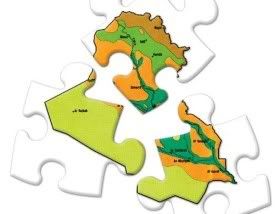Iraqi Parliament Approves Federal Law
October 11, 2006
 Iraq's parliament on Wednesday approved a law that sets out the mechanics of forming federal regions, an issue Sunni minority leaders fear might tear the country apart in sectarian civil war.
Iraq's parliament on Wednesday approved a law that sets out the mechanics of forming federal regions, an issue Sunni minority leaders fear might tear the country apart in sectarian civil war.
The law, backed by some Shi'ite majority leaders who have been keen to set up a big, autonomous region in their oil-rich south, was passed in a session boycotted by the Accordance Front, the largest political bloc of the Sunni minority.
Hostility between rival communities over federalism -- one of post-war Iraq's most sensitive issues -- is threatening the ability of the four-month-old national unity government to rein in mounting sectarian and ethnic violence.
Legislators loyal to radical Shi'ite cleric Moqtada al-Sadr and the smaller Shi'ite Fadhila Party stayed away from Wednesday's vote, showing Shi'ite support for federalism is not unanimous.
Shi'ite and Sunni leaders last month agreed to put off implementation of the federalism law for at least 18 months, effectively delaying the creation of any autonomous regions until 2008.
Sunnis, dominant under Saddam Hussein, fear a federal Iraq would hand northern and southern oilfields to ethnic Kurds and Shi'ites respectively, and would leave them trapped in a poor, desert rump state in central and western Iraq.
The biggest Shi'ite party, SCIRI, proposes merging nine of Iraq's 18 provinces into one autonomous region in the Shi'ite south. Sunnis, dominant under Saddam Hussein, want amendments to the constitution to guarantee the sharing of oil revenues.
 Iraq's parliament on Wednesday approved a law that sets out the mechanics of forming federal regions, an issue Sunni minority leaders fear might tear the country apart in sectarian civil war.
Iraq's parliament on Wednesday approved a law that sets out the mechanics of forming federal regions, an issue Sunni minority leaders fear might tear the country apart in sectarian civil war.The law, backed by some Shi'ite majority leaders who have been keen to set up a big, autonomous region in their oil-rich south, was passed in a session boycotted by the Accordance Front, the largest political bloc of the Sunni minority.
Hostility between rival communities over federalism -- one of post-war Iraq's most sensitive issues -- is threatening the ability of the four-month-old national unity government to rein in mounting sectarian and ethnic violence.
Legislators loyal to radical Shi'ite cleric Moqtada al-Sadr and the smaller Shi'ite Fadhila Party stayed away from Wednesday's vote, showing Shi'ite support for federalism is not unanimous.
Shi'ite and Sunni leaders last month agreed to put off implementation of the federalism law for at least 18 months, effectively delaying the creation of any autonomous regions until 2008.
Sunnis, dominant under Saddam Hussein, fear a federal Iraq would hand northern and southern oilfields to ethnic Kurds and Shi'ites respectively, and would leave them trapped in a poor, desert rump state in central and western Iraq.
The biggest Shi'ite party, SCIRI, proposes merging nine of Iraq's 18 provinces into one autonomous region in the Shi'ite south. Sunnis, dominant under Saddam Hussein, want amendments to the constitution to guarantee the sharing of oil revenues.




0 Comments:
Post a Comment
<< Home